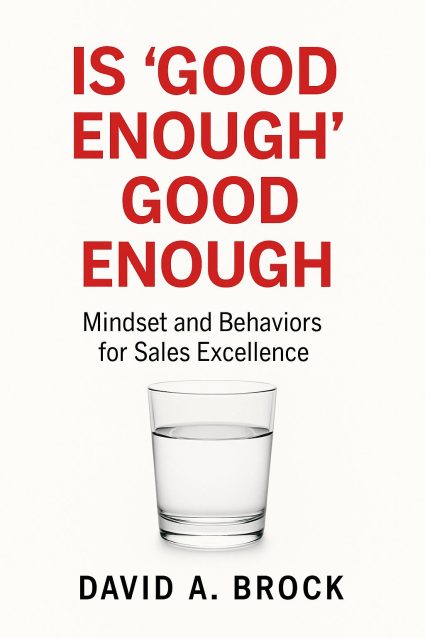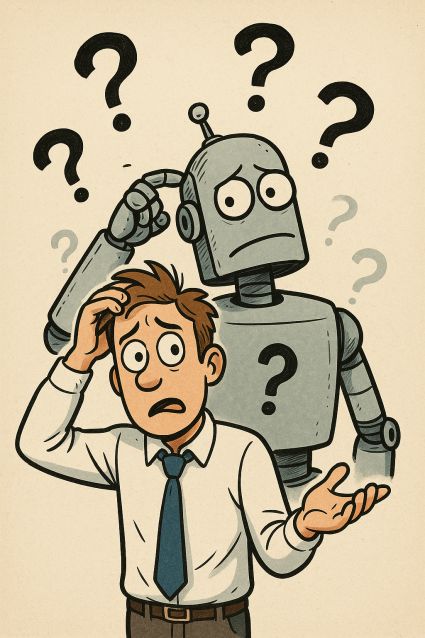Last week, I published the first of a series of posts, oriented around my upcoming book, “Is ‘Good Enough’ Good Enough.” It should hit the shelves in mid December. That post focused on “What Is Sales Excellence?”
In that article, I asked whether sales excellence is really about results, or about something deeper—mindset and behaviors. The response was fascinating, lots of comments on the post and in email about how so many are so focused on just getting by, being good enough.
But when I read my feeds, there seems to be a different story. “But what about AI? Doesn’t AI change everything?”
The reality is, AI changes nothing about what excellence means. It only amplifies what you already are.
AI is not a shortcut to excellence. It’s an amplifier. It does not discriminate between excellence or mediocre performance. It just makes that performance louder.
Some of the behaviors underlying sales excellence are curiosity, accountability, and genuine caring.
If you’re genuinely curious about your customers, AI helps you research deeper, ask better questions, and understand their business faster. But if you’re just going through the motions, AI helps you create more superficial pitches at higher volume.
If you take accountability for your results, AI helps us understand in performance, helping us adapt and improve. But if you’re already making excuses, AI just gives you something new to blame when things don’t work.
If you genuinely care about your customers, AI helps you personalize at scale without losing the personal touch. But if you’re faking it, AI helps you blast ‘personalized’ spam to hundreds of prospects who can immediately recognize it as another AI piece of trash.
The issue is, it is never about the technology, AI in this case, it’s impact is based on how we use the technology.
There are fundamentally two paths in how we use AI, and they lead to very different outcomes.
Too often, we leverage AI to do the work for us, to do all our thinking. We let AI draft all our emails. prep our calls, handle all our research, do our follow-ups. We clamor for prompts advertised in our feeds, responding, “Prompt Please.” All of these purport to do the work for us, to take over all the thinking. It’s not just that AI does it faster, it’s that we don’t have to put in the effort. We can just “phone it in.”
What happens? Skills atrophy, judgment weakens, authenticity disappears. We read all sorts of research about how our cognitive capabilities decline, when we surrender our thinking to AI. And our customers can see it, they recognize it isn’t us, but AI. And then they prefer to use AI.
There’s an alternative path. One that, unfortunately, too few use. It’s using AI as a thinking accelerator.
We can use AI to eliminate the mundane, for example: data entry, basic research, email drafts, meeting scheduling. This frees us up to do the things AI can’t do, those things that required human intervention. We can focus on the things that require human judgment: strategic thinking, relationship building, complex problem-solving, genuine connection. Engaging them in ways that create real value, building trust, and demonstrating we care about their success.
In this, we treat AI outputs as first drafts, not final answers. But we take those drafts or suggestions, adapting them to the context, the situation at the moment, and the concerns of the individuals we seek to engage. We double down on the real differentiators, the human side, deep understanding of what the customer is trying to achieve, emotional intelligence, empathy, creativity, building trust
When we use AI in this way, we completely change the game. We learn faster, research more deeply, communicate better, and serve more customers at a higher level. These are all characteristics of excellence, AI amplifies our ability to execute them.
I see too many salespeople and organizations trying to use AI to fake the fundamentals they never had. And it’s so obvious!
AI cannot genuinely care about your customer’s success. It doesn’t even care about your success! It’s just responding to that you have prompted it to do. And if you have not prompted it well, or have not debated the response, it can give you meaningless but articulate garbage.
AI It cannot exercise judgment in novel, complex, fast changing situations. It can only deal with patterns in which it has been trained. It cannot build authentic relationships, though it pretends to by being your best friend. It cannot persist through genuine adversity, it doesn’t even recognize that adversity exists..
These distinctly human capabilities, the mindsets and behaviors underlying sales excellence, the ones AI can’t replicate, are not becoming less important in the age of AI. They are more important. And when we leverage these behaviors, with AI, we outcompete and outperform everyone else.
The real issue, as we think about sales excellence and AI is not how we use it to do our work. But it’s do we have the right mindsets and foundational skills that will allow AI to amplify what we do?
Are you genuinely curious, or just going through discovery motions? Are you committed to continuous learning, or letting AI do the thinking? Do you take accountability, or look for things to blame? Do you genuinely care about your customers, or are you optimizing for efficiency?
Because whatever you are, AI will make you more of it.
If you’re excellent, AI will make you exponentially more excellent. If you’re mediocre, AI will just help you fail faster and at larger scale. As I’ve said too many times before, AI enables us to create crap at the speed of light, at virtually no incremental cost.
Like it or not (I like it), AI will be critical to our future growth and success. And it can be as critical to our failure. The only question is, Are you using it to amplify your excellence? Or to automate your mediocrity?
AI cannot make the choice for us. That’s all up to us. Which will you choose?
Afterword: I’m excited about launching Is “Good Enough” Good Eno ugh. Preliminary feedback is outstanding. It should hit Amazon in mid December!
ugh. Preliminary feedback is outstanding. It should hit Amazon in mid December!
Afterword: Here is a really outstanding AI based conversation on this article. One line really struck me, “AI is only doing what you tell it to do? Are you telling it do do the right things?” Ironically, these AI characters talk about the strengths and weaknesses of AI better than we do. Enjoy!

Leave a Reply